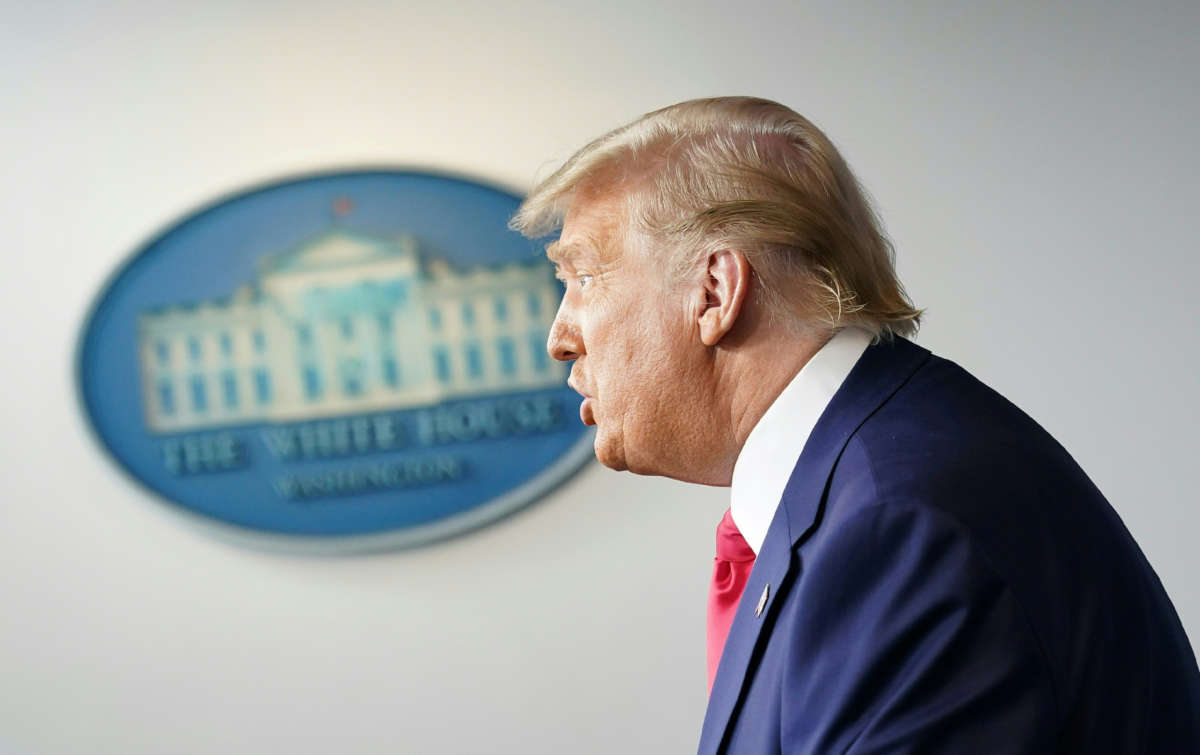Truthout is a vital news source and a living history of political struggle. If you think our work is valuable, support us with a donation of any size.
As the Dow Jones Industrial Average (DJIA) surpassed 30,000 points for the first time ever on Tuesday, President Donald Trump, appearing in a bizarre (and short) press briefing at the White House, sought to take credit for it.
A number of media sources indicated that the gains seen on Wall Street Tuesday were primarily in reaction to the General Services Administration (GSA) announcing on Monday night that it was going to formally begin the transition process for President-elect Joe Biden. Other factors that led to the outcome seen in the stock market on Monday included Biden’s selection of former Fed Chair Janet Yellen to lead the Treasury Department.
But during his approximately one-minute-long press briefing after the DJIA reached 30,000, Trump ignored those reasons and implied it was his administration’s work on the pandemic — which is viewed negatively by at least half of Americans — that caused stocks to do so well.
“I just want to congratulate everybody. The stock market, Dow Jones Industrial Average just hit 30,000, which is the highest in history,” Trump said in his remarks.
In acknowledging the benchmark that was passed, Trump also congratulated “all the people within the administration that worked so hard” to reach that measure. He then left, taking no questions from the press, and later shared the one-minute video of his press briefing to his Twitter account.
— Donald J. Trump (@realDonaldTrump) November 24, 2020
Trump’s words suggest he is reluctant to give any of the credit for the stock market gains to Biden, and the press briefing may have been held in order to respond to or dispel media reports that said otherwise.
However, four years ago, when Trump was himself the president-elect and the stock market saw a similar sizable increase, he was happy to say it was his own election win that produced that outcome. Speaking to TIME magazine in December 2016, Trump said he was hopeful that his record on the economy as president would reflect what happened before he was sworn in.
“I hope I’m judged from the time of the election, as opposed to from January 20th, because the stock market has had a tremendous bounce,” Trump said at the time.
Giving credit to Biden or Trump, however, for how the stock market performed this week may be a moot point altogether, as Wall Street is not a strong indicator of how the economy is working (or not) for the average American — a point that Biden himself tried to emphasize on the campaign trail.
“Where I come from, in Scranton and Claymont, the people don’t live off of the stock market,” the president-elect said in October.
Indeed, a number of different economic indicators reveal that millions of Americans are struggling, still reeling from the economic effects of the coronavirus pandemic. Unemployment in October, for example, was at 6.9 percent, almost double the rate of a year ago. Data collected from the Census this year has also found that “close to half of all households in the United States experienced at least some loss of employment income since March 2020.”
Income loss was higher for families of color in particular, with 58 percent of Hispanic families and 51 percent of Black families reporting income loss due to the pandemic, versus 41 percent of white families saying they lost income.
Rising levels of hunger in the U.S. are also indicating that, while stock market gains are reaching record levels, most Americans aren’t reaping any benefits from it. As of last month, more than 1 in 4 households with children had some level of food insecurity, according to a report from the Brookings Institution.
“Prior to the COVID-19 pandemic, the prevalence of moderate to severe food insecurity in the United States had continued its downward trajectory following the Great Recession,” that report’s author, Lauren Bauer, wrote. “Since the onset of the COVID-19 pandemic, food insecurity has increased in the United States.”
There have been some improvements throughout the year, with regard to hunger in the U.S., thanks to a short-term economic aid package and some children returning to schools where meal programs are available. But hunger remains an issue for millions in the country.
“Even as food insecurity is declining, the share of parents, especially parents of children younger than five, who report that their children are not eating enough is quite high by historic standards,” Bauer said.
A terrifying moment. We appeal for your support.
In the last weeks, we have witnessed an authoritarian assault on communities in Minnesota and across the nation.
The need for truthful, grassroots reporting is urgent at this cataclysmic historical moment. Yet, Trump-aligned billionaires and other allies have taken over many legacy media outlets — the culmination of a decades-long campaign to place control of the narrative into the hands of the political right.
We refuse to let Trump’s blatant propaganda machine go unchecked. Untethered to corporate ownership or advertisers, Truthout remains fearless in our reporting and our determination to use journalism as a tool for justice.
But we need your help just to fund our basic expenses. Over 80 percent of Truthout’s funding comes from small individual donations from our community of readers, and over a third of our total budget is supported by recurring monthly donors.
Truthout has launched a fundraiser to add 432 new monthly donors in the next 7 days. Whether you can make a small monthly donation or a larger one-time gift, Truthout only works with your support.
